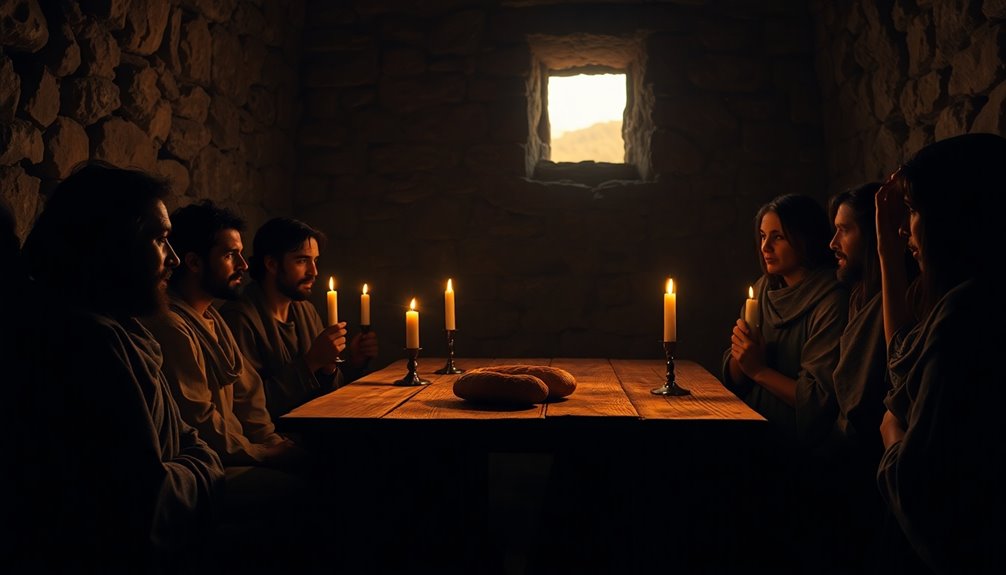Romans 8:28 assures you that everything in your life—both the good and the challenging—works together for your benefit if you love God. It emphasizes that "good" doesn't always mean immediate happiness or success; instead, it relates to your spiritual growth and future glory. Even your struggles can deepen your faith and character, proving God's goodness amidst trials. This verse is part of a larger conversation about suffering and redemption, reminding you that every experience has divine purpose. There's much more to explore about how life's challenges can shape you in unexpected ways.
Key Takeaways
- Romans 8:28 emphasizes that God works all things for good for those who love Him, focusing on spiritual growth rather than worldly success.
- The "good" mentioned refers to spiritual maturity and future glorification, not immediate happiness or material gain.
- Suffering and trials are integral to God's plan, contributing to believers' character development and deeper faith.
- The verse reassures believers that every experience, including hardships, serves a divine purpose within the larger narrative of redemption.
- Understanding Romans 8:28 requires recognizing the context of suffering and the eternal perspective on life's challenges.
Introduction

When you dive into Romans 8:28, you encounter a powerful promise that reassures believers of God's unwavering providence. This verse highlights how God works for the good of those who love Him, emphasizing that your love and obedience play a crucial role in experiencing His purpose. It's not just about feeling good or achieving worldly success; the "good" refers to spiritual growth and future glorification.
The phrase "all things" is particularly significant. It includes every experience, even suffering, which can be challenging to understand. However, this promise assures you that God can bring about a greater purpose through your struggles. You're not alone in facing difficulties; God's providence means that even your toughest moments are part of a divine plan.
As you reflect on this scripture, remember that it calls you to trust in God's wisdom and timing. You're invited to embrace your relationship with Him, knowing that your love and commitment will lead to fulfillment according to His purpose.
In the grand narrative of redemption, God's promises shine brightly, reminding you that every experience, good or bad, can work together for your ultimate good.
Scriptural Insights and References

When you look at Romans 8:28, you'll find that it connects deeply with other biblical passages that reinforce the themes of God's providence and purpose.
Exploring primary and secondary references can enrich your understanding of how God works through all circumstances in the lives of believers.
Let's uncover these insights to see how they illuminate the message of hope and assurance found in this verse.
Primary Bible References
In exploring the primary Bible references related to Romans 8:28, you'll find that this verse is deeply rooted in the broader context of Romans 8, particularly verses 18-30. Here, Paul discusses the suffering of creation and the hope for future glory, emphasizing that the "good" God promises often involves spiritual development rather than immediate comfort.
The phrase "all things" in Romans 8:28 highlights that every experience, even pain and adversity, is part of God's plan, working all things together for those who love God. This underscores that the ultimate good isn't necessarily material success but rather being conformed to the image of Christ and attaining God's glory in eternity.
Importantly, Romans 8:28 is directed specifically at Christians who love God, establishing that this divine promise is conditional upon a relationship characterized by love and obedience to His purpose.
As you reflect on this passage, it becomes clear that trusting in God's sovereignty allows you to navigate life's challenges with the assurance that He's always at work for your good.
Secondary Bible References
Throughout Scripture, multiple passages echo the themes found in Romans 8:28, providing deeper insight into God's purpose in our lives. For instance, James 1:2-4 encourages you to consider it pure joy when facing trials, as these challenges lead to spiritual growth. This aligns with the idea that God works in *all things*, even suffering, to cultivate character and faith in those who *love God*.
Jeremiah 29:11 reassures you of God's plans for hope and a future, reinforcing the promise that He actively works for the *good* of those who seek Him. This *good* isn't always immediate happiness but is tied to fulfilling His divine *purpose*.
Moreover, 2 Corinthians 4:17 highlights that your present sufferings are preparing you for an eternal glory that far outweighs them all, echoing the transformative journey outlined in Romans 8:28.
These secondary references deepen your understanding that the promise of Romans 8:28 is specific to believers in a covenant relationship with God, assuring you that even in hardship, His overarching plan remains steadfast and hopeful.
Early Christian Community Struggles

How did the early Christian community manage to persevere amid intense persecution and social ostracism? Their struggles were profound, as they faced constant marginalization within the broader Roman society. Many early Christians grappled with their faith, torn between adhering to Jewish law and embracing the freedom offered through Christ. This internal conflict often created tensions within their community, challenging their unity.
In times of suffering and uncertainty, early Christians turned to letters from apostles like Paul for guidance. Romans 8:28 became a lifeline, reminding them that God works for the good of those who love Him, even amid persecution. This assurance provided the theological clarity they desperately needed, reinforcing their resolve to endure.
The communal sharing of resources and mutual support was vital for survival, particularly as many faced economic hardships due to their faith commitments. Their hope in resurrection and eternal life, highlighted in teachings surrounding Romans 8:28, served as a central pillar that strengthened their community.
Together, they learned that even in their darkest moments, their struggles could ultimately lead to a deeper understanding of God's purpose, fostering resilience and solidarity among them.
Contextual Understanding of Romans 8:28

To grasp the true significance of Romans 8:28, it's essential to dive into its surrounding context. This verse is nestled within a larger discourse from verses 18-30 that addresses suffering, the longing for redemption, and the hope of future glory for believers. When you consider this context, it becomes clear that the promise of "good" applies specifically to those who love God and are called according to His purpose.
Understanding Romans 8:28 requires recognizing that the phrase "all things" includes pain and hardship. God's involvement in these experiences ensures they serve a greater purpose, often beyond our immediate understanding. This doesn't mean that you'll find instant happiness or relief from suffering; rather, it highlights God's redemptive work amid life's challenges.
Ultimately, the "good" referenced in the verse transcends temporary comfort. It relates to spiritual growth and glorification in eternity, aligning with God's glory.
Misinterpretations of "good

When you hear the term "good" in Romans 8:28, it's easy to think it means everything will turn out perfectly or happily.
However, true goodness in this context often relates to spiritual growth, not just immediate pleasure or success.
Let's explore how misunderstandings about divine goodness can shape your perspective on suffering and God's plan.
Debunk Common Misunderstandings
Many people misinterpret the term "good" in Romans 8:28, thinking it suggests that all events in life are positive or beneficial. However, "good" doesn't necessarily mean that every experience you face will be enjoyable or pleasant. The Bible clearly identifies certain actions and events as evil or unjust. Instead of promising immediate happiness, this verse emphasizes that God is working through your suffering and hardship for a greater purpose.
In the context of Romans, the "good" referenced aligns with spiritual growth and glorification in eternity, rather than fleeting comforts or worldly success.
It's crucial to remember that while you may encounter trials, these experiences can serve to develop your character and deepen your faith. Understanding that God is working all things together for good reinforces the idea that this promise applies specifically to those who love Him and are called according to His purpose.
This conditional nature of "good" highlights that the ultimate outcome may not be evident in your current situation, but trust that God is at work in ways beyond your understanding.
Misunderstanding of Divine Goodness
In the quest to understand Romans 8:28, people often misinterpret the concept of "good," leading to confusion about God's intentions. Many mistakenly equate "good" with immediate happiness or material success, ignoring the reality of suffering and the complexities of a fallen world. This misunderstanding can obscure the broader spiritual implications of God's promise.
The term "good" in this context doesn't mean all experiences will feel pleasant or comfortable. Instead, it relates to God's ultimate purpose for you. His promise assures that even in times of pain, He can work through those experiences to foster spiritual growth and character development. This perspective shifts your understanding from seeking mere comfort to recognizing the divine intention behind struggles.
It's crucial to realize that God's definition of "good" often differs from human expectations. His goodness aligns with your glorification and His overarching plan for humanity. By embracing this truth, you can find peace in knowing that even when life feels challenging, there's a greater purpose at work.
This understanding can transform suffering into a source of strength, reminding you that God is always good, even amidst trials.
Real-Life Testimonies of Hope

Have you ever faced challenges that ultimately led to personal growth?
Stories like those of Larry and Amalia remind us that adversity can strengthen our faith and foster resilience in our communities. As you reflect on your own experiences, consider how God's plan may be at work in your life, even in tough times. Often, these moments of difficulty can lead to supportive partner relationships that help us navigate the journey ahead.
Personal Growth Through Adversity
Throughout life, challenges often serve as catalysts for profound personal growth, revealing untapped potential and divine purpose.
Take Larry Ward, for example. At 45, he left a lucrative job to found Food for the Hungry, surrendering financial security for a mission driven by his love for God. This leap into adversity transformed his life, allowing him to experience spiritual and personal growth beyond his expectations.
Similarly, Amalia Toc's journey shows how embracing God's call can lead to incredible transformations. Once a sponsored child, she chose to leave a promising career to serve others, turning her personal trials into a path of hope and purpose.
Both stories illustrate that, while adversity is often daunting, it can lead to an enriching, transformative experience.
Research backs this up, revealing that those who find meaning in their suffering often enjoy better mental health and resilience.
Fostering Resilience in Fellowship
Adversity often brings people together, creating bonds that strengthen faith and resilience. Consider the inspiring testimonies of individuals like Larry Ward and Amalia Toc. Both faced significant challenges but turned their struggles into an opportunity to serve others. Their commitment to God's purpose not only transformed their lives but also reinforced their resilience in the face of adversity.
Larry and Amalia initially wrestled with doubts, yet through their fellowship and shared experiences, they discovered the power of community support. This connection allowed them to navigate their challenges while focusing on the greater good. They remind us that trusting in divine providence can lead to profound changes.
Engaging in fellowship helps you recognize the unseen workings of God in difficult circumstances. When you share your experiences, you inspire others to adopt a hopeful outlook. Additionally, the importance of financial planning for care can serve as a reminder that practical support is also a vital part of resilience.
This collective resilience fosters a community rooted in the belief that all things work together for good. By leaning on each other, you can find strength in your faith and uplift those around you, creating a ripple effect of hope and motivation for everyone involved.
Together, you can navigate life's storms, knowing there's purpose in every struggle.
Eternal Perspective on Adversity

Viewing life's challenges through an eternal lens can significantly shift your perspective on suffering. When you embrace the truth that God works all things together for your ultimate good, adversity serves a purpose that transcends your immediate struggles. Romans 8:28 reminds you that every trial is part of a divine plan, molding you into the likeness of Christ.
This eternal perspective on adversity reassures you that your present sufferings pale in comparison to the glory that awaits (Romans 8:18). By recognizing that God is actively working according to His purpose, you can find hope and motivation to persevere through hardships.
Just as James 1:2-4 encourages joy in trials, understanding that these experiences contribute to your spiritual maturity can transform your outlook.
Moreover, God's overarching plan includes the redemption of creation itself, meaning your struggles are woven into a larger narrative leading to the ultimate restoration of all things (Romans 8:19-23).
Additional Resources

Finding support and guidance in your spiritual journey can enhance your understanding of Romans 8:28 and its profound implications. To dive deeper into this verse, consider exploring commentaries that break down its context, especially the surrounding verses that discuss suffering and future glory. This can help you grasp how "all things work together for good" isn't about immediate happiness, but about a divine purpose that shapes your spiritual maturity.
You might also find value in Bible study groups or online forums where discussions about Romans take place. Engaging with others who love God can provide different perspectives on how suffering can ultimately lead to growth and fulfillment.
Books focused on the themes of purpose and suffering in the Christian life can further illuminate your journey. Authors often share personal stories that reveal how God's love and plans unfold through hardships.
Lastly, consider listening to sermons or podcasts that address Romans 8. Hearing different interpretations can enrich your understanding of how God works in your life, reminding you that every experience, even painful ones, can serve a greater purpose in your walk of faith.
Frequently Asked Questions
What Is the Message of Romans 8 28?
The message of Romans 8:28 assures you that everything in your life, even the tough times, can work together for good.
It emphasizes that if you love God and align with His purpose, He's actively involved in your circumstances.
This isn't about immediate happiness but about spiritual growth and deeper faith.
You can trust that God's plans, even through struggles, lead you towards a greater purpose and transformation in your life.
What Does 828 Mean in the Bible?
In the Bible, numbers often hold symbolic meanings. The number 828 can be seen as a representation of God's promise and assurance.
It signifies the interconnectedness of divine purpose and personal growth. You might interpret 8 as new beginnings or resurrection, while 2 often symbolizes unity.
Together, they hint at the idea that through challenges, you're called to embrace transformation and trust in a higher plan, encouraging you toward spiritual fulfillment.
What Is the Prayer for Romans 8 28?
When you pray for Romans 8:28, you acknowledge God's sovereignty in all circumstances.
You might express your trust in His plan, asking for clarity and strength to see His purpose in your struggles.
You could seek comfort, asking God to reveal His presence during tough times.
It's also a moment to thank Him for the unseen blessings and to deepen your love for Him, aligning your life with His greater purpose.
What Is the Bible Verse Romans 828?
Romans 8:28 is a powerful verse in the Bible that states, "And we know that in all things God works for the good of those who love him, who've been called according to his purpose."
This verse reassures you that God is actively involved in your life, orchestrating events for your ultimate benefit.
It emphasizes a relationship between your love for God and the blessings that follow, even amid challenges.










